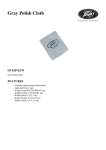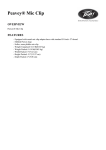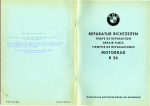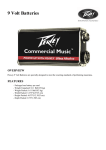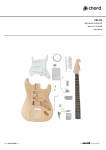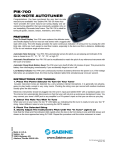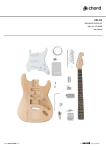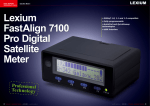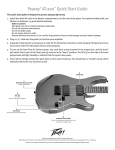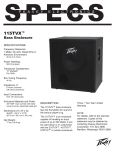Download Peavey HP Special User's Manual
Transcript
H P™ S P E C I A L G U I T A R O P E R AT I N G GUIDE Warnings All amplification accessories, microphones, mixers, etc., must be properly grounded and should be utilized with a 3-wire mains system in order to prevent electrical shock. Do not come into contact with other electrical apparatus when playing (or touching) your instrument. The metal parts of this instrument are grounded according to proper and accepted industry practice, but it is possible to encounter an electrical shock when coming into contact with another electrical apparatus if it has improper grounding facilities. Do not use improper or poorly designed guitar straps or other means of support. Possible injury could result if improper, inferior, ill-fitting, or worn out straps are used. The instrument could possibly fall, causing bodily injury or damage to the instrument or associated equipment if the holding devices fail for any reason. Guitar strings are made from very strong steel alloys and are under considerable tension when tuned to pitch. Exercise extreme care when tuning (especially above concert pitch) or when employing string bending or "popping" playing techniques. The possibility of string breakage and personal injury exists under these conditions. The patch cord between the guitar and Note the amplifier is an extremely important link for optimum per formance. A high-quality, well-shielded cord should be used in this application. Floyd Rose® is a registered trademark of Floyd Rose Marketing, Inc. Switchcraft® is a registered trademark of Switchcraft, Inc. 1 Contents: 2 Introduction......................................................................................................... 3 Features Body....................................................................................................... 3 Electronics........................................................................................... 3 Neck....................................................................................................... 3 Hardware.............................................................................................. 3 Construction.........................................................................................................4 Body....................................................................................................... 4 Neck....................................................................................................... 4 Pickups...................................................................................................4 Controls Pickup Selector Switch.................................................................... 4 Volume.................................................................................................. 4 Tone Control....................................................................................... 5 Output Jack......................................................................................... 5 Adjustments......................................................................................................... 5 Torsion Rod......................................................................................... 5 Tremolo Bridge.................................................................................. 6 String Retainer Bar........................................................................... 6 Locking Topnut. ................................................................................ 6 String Installation.............................................................................. 7 Tremolo Bridge Height/Tension.................................................. 7 Tremolo Arm....................................................................................... 8 Lok Block™............................................................................................8 Tune-O-Matic Bridge........................................................................8 String Intonation................................................................................................ 8 Care of Your Instrument............................................................................... . 10 Temperature & Humidity............................................................ 10 Strings............................................................................................... . 10 Finish................................................................................................. . 10 Accessories...................................................................................... . 10 Warnings............................................................................................................. 11 Español .................................................................................................................... Français ................................................................................................................... Deutsch ................................................................................................................... Warranty................................................................................................................... Introduction Thank you for buying a Peavey® HP™ Special guitar. This guitar was built by the most skilled craftsmen and made from the finest materials available. As with all of our musical equipment, we have built our guitars using a combination of leading-edge technology and traditional handcrafted methods. Ask your Peavey dealer for a full list of other Peavey musical equipment and accessories. HP Special Features Body • Solid basswood construction • Unique offset cutaway design Neck • Hard rock maple neck and fingerboard, oil-finished • Dual graphite reinforcements and adjustable torsion rod • 25 1/2" scale length, 22 jumbo frets • 15" fingerboard radius • Straight headstock with 3+3 tuning machine configuration • Bolt-on construction with contoured neck heel • 5/8" Nut width Electronics • Two custom-wound Peavey hum cancelling pickups • Master volume control • Switchcraft® 3-way toggle switch and output jack Hardware • Precision die-cast tuning machines • Peavey/Floyd Rose® licensed, double-locking tremolo assembly • Chrome-plated hardware finish 3 Construction Body The body of this instrument is constructed of select basswood chosen specifically for tonal qualities as well as for weight characteristics. The HP Special with transparent finishes also feature a beautiful AAA maple top. The offset, asymmetrical body design offers comfort, proper balance and maximum playing ease. Neck The select hard rock maple neck is crafted to provide unmatched rigidity and freedom from warpage. Additional strength is provided by the dual graphite reinforcement bars and an easy access, adjustable steel torsion rod. (See Adjustments–Torsion Rod for adjustment instructions.) Pickups The two Peavey hum cancelling pickups, custom hand-wound in our Meridian, Mississippi custom shop, supply optimal output and tonal response. A two-step wax dipping process is used to provide ultra-low noise operation and resistance to microphonic feedback. The pickups are mounted DIRECTLY TO THE BODY, which further reduces feedback at high volume levels and offers enhanced tonal response. Controls Pickup Selector Switch (1) This three-position switch allows selection of pickups in various combinations. The selection possibilities are as follows: • Up = Bridge pickup • Center = Both pickups • Down = Neck pickup Volume (2) 2 1 3 4 The volume knob controls the total signal delivered from both pickups. Rotating clockwise will increase volume; rotating counterclockwise will reduce volume. 4 Tone Control (3) Simple passive tone control. Rotating clockwise increases treble while rotating counterclockwise decreases treble. Output Jack (4) The output jack accepts standard guitar patch cords. ( We recommend high-quality Peavey “shielded” patch cords.) Adjustments Your instrument has been carefully adjusted at the Peavey factory for accurate intonation and playing ease. However, your playing style and requirements may necessitate additional adjustments. These should be made by your authorized Peavey dealer; but with a little care and by closely adhering to the following instructions, you may attempt these adjustments yourself. Please read the instructions thoroughly before attempting any adjustments. Torsion Rod (1) All guitar necks have a slight amount of bow to keep the strings from “buzzing” on the frets. This instrument features an easy access torsion rod adjustment wheel located at the end of the neck. This wheel can be adjusted with a hex wrench or small screwdriver. Just insert the tool into the adjustment wheel and rotate accordingly. 1. 2. 3. 5 Tune the instrument to standard (A-440) pitch. Fret the sixth string (E) at the first and last frets. Check for clearance between the string and the eighth fret. 1 4. 5. 6. Clearance should be no less than .005" and no more than .015". To increase clearance‚ loosen (counterclock- wise) the torsion rod adjustment wheel. Less clearance (straightening of the neck) is accomplished by tightening (clockwise) the torsion rod adjustment wheel. Retune the instrument and repeat steps 1-5 until proper clearance has been achieved. Tremolo Bridge The Peavey Floyd Rose®-licensed, double-locking tremolo system features a locking topnut, locking bridge saddles and a steel bridge plate with a massive brass inertia block for maximum tuning stability, sustain and tonal response. This tremolo system has been carefully adjusted for accurate intonation, playing ease and pitch change. To adjust this unit properly, you must first understand the operating principle. The strings are clamped at the locking topnut and bridge areas, ensuring increased tuning stability during use. Proper tremolo action is also a result of accurate balancing between string tension and tremolo spring tension. This instrument has been set up at the factory with high-quality Peavey Elements™ guitar strings. Should you desire a larger or smaller gauge of strings, the spring tension, and intonation, must be adjusted. For string changes, and in case an adjustment needs to be made, please read the instructions carefully. String Retainer Bar (1) The string retainer bar is used to provide the proper amount of downward string pressure over the locking topnut. This should be adjusted only low enough to keep the strings in contact with the surface of the locking topnut, which will prevent the strings from going sharp in pitch after tightening the locking topnut. 1 2 Locking Topnut (2) (at headstock) With the supplied 3mm hex wrench, loosen the three locking topnut screws to allow the strings to pass through the string slots. Tune to pitch and tighten locking topnut screws until snug. DO NOT OVERTIGHTEN SCREWS. 6 String Installation After loosening topnut screws (at headstock), use tuning machines to remove string tension. Loosen string lock bolts at bridge approximately three turns using the 3mm hex wrench. Insert string end through tuning machines and locking topnut. Cut off excess string length approximately one inch past string of lock bolts. Insert string end into bridge saddle (between saddle housing and lock block) and tighten until snug. DO NOT OVERTIGHTEN. Adjust fine tuning knobs to middle position. Stretch strings and tune to pitch. Tighten locking topnut, stretch string once more and fine-tune to pitch. Tremolo Bridge Height Bridge height may be adjusted by means of the bridge pivot bolts. Turn the pivot bolts clockwise to reduce bridge height. Turn the pivot bolts counterclockwise to increase bridge height. Tremolo Bridge Tension The tension of the tremolo bridge is set by adjusting the spring tension screws which hold the spring claw in place. To gain access to the spring tension screws and spring claw, remove the spring cover on the back of the guitar. The instrument is equipped with two springs, which allow proper tension for the string gauge supplied with the guitar. The extra spring is enclosed should you prefer to use a heavier string gauge. Proper tremolo tension is achieved when the bottom of the tremolo bridge plate rests on the top surface of the guitar body without requiring excessive force to depress the tremolo arm. The tremolo can be adjusted to operate as a floating style tremolo by loosening the spring tension. Turn the spring tension screws clockwise to increase the spring tension, and counterclockwise to decrease the spring tension. This instrument should be tuned to proper pitch (A-440) before and after making adjustments. 7 Note CAUTION: Loosen all string tension before installing or removing tension springs. Tremolo springs are designed for high tension. Extreme care should be taken when installing and removing these springs. Tremolo Arm The tremolo arm is inserted and screwed into the tremolo arm socket on the bridge plate. This assembly can be adjusted to control the amount of torque required to rotate the tremolo arm. Some players prefer the tremolo arm to stay in place when used. This can be accomplished by using the supplied 12mm wrench to hold the top of the tremolo arm socket while screwing the tremolo arm firmly into place. If you prefer to have the tremolo arm swing freely, loosen the nut on the bottom of the tremolo arm socket. This is accessible through the tremolo spring pocket. Lok Block™ 1 2 For HP Specials equipped with the Floyd Rose licensed tremolo, we have included another Peavey innovation called the Lok Block. By loosening the screws (#1 & 2 at left) with the included hex wrench and sliding the Block back and forth, you can choose between a floating style tremolo or a more traditional tremolo that only has downward movement. With the Lok Block, you can choose for yourself! String-thru bridge If you have purchased a Stop Tail version of the HP Special, then you have a string through the body bridge system with the patented Peavey Dual Compression tailpiece. The stringthru style bridge has height adjustments on either side for fine tuning the string height to your personal taste, and each string has individual intonation adjustments (see below for instructions on setting intonation). The patented Dual Compression bridge features through the body solid brass ferrules. The ferrules actually tighten/couple the tailpiece to the body thus allowing for better sustain. The tailpiece is also designed for simply stringing through the back of the tail piece as a normal stoptail would allow. This unique design 8 also allows for a combination of ways to string the instrument. For instance all treble strings thru the body, and all bass strings thru back of tailpiece, or any combination of the two, allowing you to customize string tension for each string. SAccurate tring Intonation string intonation settings ensure that your instru- ment will play in tune at any point on the neck. Although “perfect intonation” is an impossibility with a fretted instrument, the proper adjustments will maximize the accuracy of individual notes up and down the neck. Intonation is set by comparing the pitch of an open string to the pitch of the same string when played one octave higher at the 12th fret. The actual “vibrating length” of that string is varied until the notes are both at the correct pitch. The vibrating length of the string is altered by adjusting the individual saddles either forward or backward, depending on whether the fretted note is sharper or flatter in pitch than the open note. Note This process should always be performed with new strings. Intonation problems can often result from worn strings. It is often difficult for the untrained ear to determine when the open note and the fretted note are at precisely the same pitch. Some players find that comparing the 12th fret harmonic of the string (rather than the open note) to the fretted note is much easier. A harmonic is played by plucking the string with the right hand while touching the string with the left index finger (as lightly as possible) directly above the 12th fret. The left finger is drawn away as quickly as possible after the string is plucked, producing a “chime” effect. This chimed note is then compared to the fretted note. For greater ease and accuracy, we recommend one of the many types of electronic guitar tuners that are available from most music stores. 9 1. 2. 3. 4. Ensure that the torsion rod and string-height settings are accurate and the strings are new. Tune the instrument to standard (A-440) pitch. Hold the instrument in a normal playing position or place the guitar on a clean, flat surface so that the body is in contact with the work surface. Any pressure on the neck will affect intonation settings. Play the first (E) string open and compare it to the pitch of the same string when it is played at the 12th fret. These notes should sound the same (actually, there is an octave difference). 5. Using a 2.5mm hex wrench for the tremolo or mini blade style screwdriver for the string-thru, adjust the string saddle so that both the fretted and open notes are the same. If the fretted note is sharper than the open note, the vibrating length of the string must be increased. Move the bridge saddle to the rear, away from the pickups. If the fretted note is flat, the vibrat- ing length must be shortened. Move the bridge saddle forward, toward the pickups to shorten the length. Note It will often be necessary to retune the open string to standard pitch after the bridge position is altered. 6. Repeat steps 4 and 5 for the remaining strings. 7. Repeat steps 1-6 until the intonation of all the strings is accurately adjusted. Care of your Instrument The HP™ Special USA is a high-quality musical instrument constructed from the finest materials, using the most up-todate production methods. With reasonable care, it should provide many years of service and outstanding playability. Temperature and Humidity It is important to protect your instrument from any extreme or sudden changes in temperature or humidity. You should store the instrument in its case when not using it. Strings Your instrument is equipped with high-quality Peavey® Elements™ strings. String life may be greatly extended by frequent cleanings with string cleaner. Dirt and perspiration tend to build up on the underside of the strings, so it is often necessary to slide a rag between the strings and the fingerboard. Dirt-laden strings cause tuning and intonation problems, as well as rust and corrosion. For optimum performance, strings should be changed approximately once a month, or after about every twentyfour hours of playing. Some players prefer to change strings more often. 10 Finish Your instrument has a polyester/urethane protective finish that is both durable and weather resistant, but requires care. Regular cleaning with Peavey guitar polish is recommended. Between polishes, the instrument should be wiped with a dry, soft cloth. Accessories Peavey offers a full line of accessories for your instruments. Cases, amplifiers, strings, polishes, straps and more are all available from a Peavey dealer near you. 11 Notes: 12 50 PEAVEY ELECTRONICS CORPORATION LIMITED WARRANTY Effective Date: June 14, 2006 What This Warranty Covers Your Peavey Warranty covers defects in material and workmanship in Peavey products purchased and serviced in the U.S.A. and Canada. What This Warranty Does Not Cover The Warranty does not cover: (1) damage caused by accident, misuse, abuse, improper installation or operation, rental, product modification or neglect; (2) damage occurring during shipment; (3) damage caused by repair or service performed by persons not authorized by Peavey; (4) products on which the serial number has been altered, defaced or removed; (5) products not purchased from an Authorized Peavey Dealer. Who This Warranty Protects This Warranty protects only the original retail purchaser of the product. How Long This Warranty Lasts The Warranty begins on the date of purchase by the original retail purchaser. The duration of the Warranty is as follows: Product Category Duration Guitars/Basses, Amplifiers, Pre-Amplifiers, Mixers, Electronic Crossovers and Equalizers 2 years (+ 3 years)* Drums 2 years (+ 1 year)* Enclosures 3 years (+ 2 years)* Digital Effect Devices and Keyboard and MIDI Controllers 1 year (+ 1 year)* Microphones 2 years Speaker Components (incl. speakers, baskets, drivers, diaphragm replacement kits and passive crossovers) and all Accessories 1 year Tubes and Meters 90 days Cables Limited Lifetime [*Denotes additional warranty period applicable if optional Warranty Registration Card is completed and returned to Peavey by original retail purchaser within 90 days of purchase.] What Peavey Will Do We will repair or replace (at Peavey's discretion) products covered by warranty at no charge for labor or materials. If the product or component must be shipped to Peavey for warranty service, the consumer must pay initial shipping charges. If the repairs are covered by warranty, Peavey will pay the return shipping charges. How To Get Warranty Service (1) Take the defective item and your sales receipt or other proof of date of purchase to your Authorized Peavey Dealer or Authorized Peavey Service Center. OR (2) Ship the defective item, prepaid, to Peavey Electronics Corporation, International Service Center, 412 Highway 11 & 80 East, Meridian, MS 39301. Include a detailed description of the problem, together with a copy of your sales receipt or other proof of date of purchase as evidence of warranty coverage. Also provide a complete return address. Limitation of Implied Warranties ANY IMPLIED WARRANTIES, INCLUDING WARRANTIES OF MERCHANTABILITY AND FITNESS FOR A PARTICULAR PURPOSE, ARE LIMITED IN DURATION TO THE LENGTH OF THIS WARRANTY. Some states do not allow limitations on how long an implied warranty lasts, so the above limitation may not apply to you. Exclusions of Damages PEAVEY'S LIABILITY FOR ANY DEFECTIVE PRODUCT IS LIMITED TO THE REPAIR OR REPLACEMENT OF THE PRODUCT, AT PEAVEY'S OPTION. IF WE ELECT TO REPLACE THE PRODUCT, THE REPLACEMENT MAY BE A RECONDITIONED UNIT. PEAVEY SHALL NOT BE LIABLE FOR DAMAGES BASED ON INCONVENIENCE, LOSS OF USE, LOST PROFITS, LOST SAVINGS, DAMAGE TO ANY OTHER EQUIPMENT OR OTHER ITEMS AT THE SITE OF USE, OR ANY OTHER DAMAGES WHETHER INCIDENTAL, CONSEQUENTIAL OR OTHERWISE, EVEN IF PEAVEY HAS BEEN ADVISED OF THE POSSIBILITY OF SUCH DAMAGES. Some states do not allow the exclusion or limitation of incidental or consequential damages, so the above limitation or exclusion may not apply to you. This Warranty gives you specific legal rights, and you may also have other rights which vary from state to state. If you have any questions about this warranty or service received or if you need assistance in locating an Authorized Service Center, please contact the Peavey International Service Center at (601) 483-5365. Features and specifications subject to change without notice. Logo referenced in Directive 2002/96/EC Annex IV (OJ(L)37/38,13.02.03 and defined in EN 50419: 2005 The bar is the symbol for marking of new waste and is applied only to equipment manufactured after 13 August 2005 2 13 51 14 Features and specifications subject to change without notice. Peavey Electronics Corporation • 5022 Hartley Peavey Drive • Meridian, MS • 39305 (601) 483-5365 • FAX (601) 486-1278 • www.peavey.com 2009 Printed in the U.S.A. 11/08
















